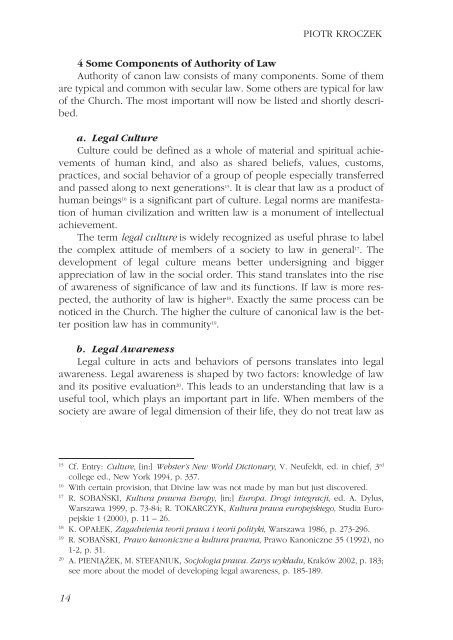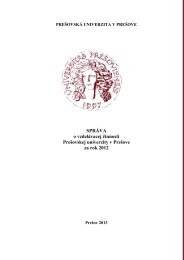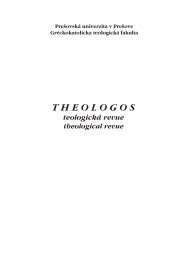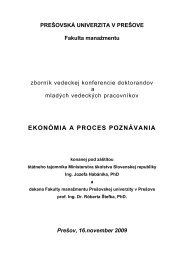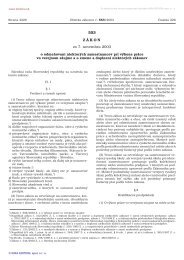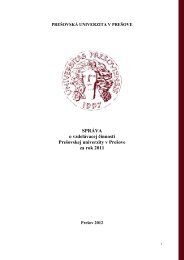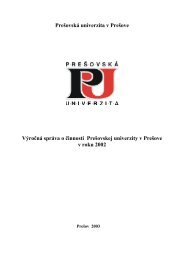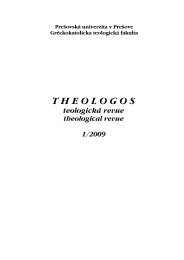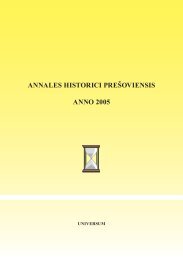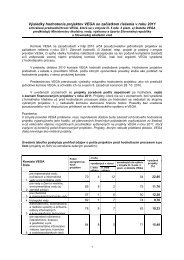- Page 1 and 2: Prešovská univerzita v Prešove G
- Page 3 and 4: Obsah Piotr Kroczek Authority of Ca
- Page 5 and 6: MARIÁN AMBROZY KARABA, M: Filozofi
- Page 7 and 8: Peter Tirpák Impulses for Liturgic
- Page 9 and 10: THEOLOGOS 2/2010 | ŠTÚDIE Authori
- Page 11 and 12: THEOLOGOS 2/2010 | ŠTÚDIE Canon l
- Page 13: THEOLOGOS 2/2010 | ŠTÚDIE is law
- Page 17 and 18: THEOLOGOS 2/2010 | ŠTÚDIE A great
- Page 19 and 20: THEOLOGOS 2/2010 | ŠTÚDIE norms h
- Page 21 and 22: THEOLOGOS 2/2010 | ŠTÚDIE Concept
- Page 23 and 24: THEOLOGOS 2/2010 | ŠTÚDIE tional
- Page 25 and 26: THEOLOGOS 2/2010 | ŠTÚDIE time of
- Page 27 and 28: THEOLOGOS 2/2010 | ŠTÚDIE initiat
- Page 29 and 30: THEOLOGOS 2/2010 | ŠTÚDIE criteri
- Page 31 and 32: THEOLOGOS 2/2010 | ŠTÚDIE This is
- Page 33 and 34: THEOLOGOS 2/2010 | ŠTÚDIE The cha
- Page 35 and 36: THEOLOGOS 2/2010 | ŠTÚDIE proclai
- Page 37 and 38: THEOLOGOS 2/2010 | ŠTÚDIE Mediter
- Page 39 and 40: THEOLOGOS 2/2010 | ŠTÚDIE GILLESP
- Page 41 and 42: THEOLOGOS 2/2010 | ŠTÚDIE Europe
- Page 43 and 44: THEOLOGOS 2/2010 | ŠTÚDIE Pawłow
- Page 45 and 46: THEOLOGOS 2/2010 | ŠTÚDIE spoglą
- Page 47 and 48: THEOLOGOS 2/2010 | ŠTÚDIE ji mitu
- Page 49 and 50: THEOLOGOS 2/2010 | ŠTÚDIE który
- Page 51 and 52: THEOLOGOS 2/2010 | ŠTÚDIE platoń
- Page 53 and 54: THEOLOGOS 2/2010 | ŠTÚDIE SLODIČ
- Page 55 and 56: THEOLOGOS 2/2010 | ŠTÚDIE Herbert
- Page 57 and 58: THEOLOGOS 2/2010 | ŠTÚDIE lický
- Page 59 and 60: THEOLOGOS 2/2010 | ŠTÚDIE logick
- Page 61 and 62: THEOLOGOS 2/2010 | ŠTÚDIE Zákon
- Page 63 and 64: THEOLOGOS 2/2010 | ŠTÚDIE svět c
- Page 65 and 66:
THEOLOGOS 2/2010 | ŠTÚDIE patřil
- Page 67 and 68:
THEOLOGOS 2/2010 | ŠTÚDIE lásky
- Page 69 and 70:
THEOLOGOS 2/2010 | ŠTÚDIE Krista.
- Page 71 and 72:
THEOLOGOS 2/2010 | ŠTÚDIE Pozoruh
- Page 73 and 74:
THEOLOGOS 2/2010 | ŠTÚDIE Z toho,
- Page 75 and 76:
THEOLOGOS 2/2010 | ŠTÚDIE K paral
- Page 77 and 78:
THEOLOGOS 2/2010 | ŠTÚDIE . Aj ke
- Page 79 and 80:
THEOLOGOS 2/2010 | ŠTÚDIE nosťou
- Page 81 and 82:
THEOLOGOS 2/2010 | ŠTÚDIE pre sve
- Page 83 and 84:
THEOLOGOS 2/2010 | ŠTÚDIE náhoda
- Page 85 and 86:
THEOLOGOS 2/2010 | ŠTÚDIE Duchovn
- Page 87 and 88:
THEOLOGOS 2/2010 | ŠTÚDIE slabá
- Page 89 and 90:
THEOLOGOS 2/2010 | ŠTÚDIE 5. Vonk
- Page 91 and 92:
THEOLOGOS 2/2010 | ŠTÚDIE V tomto
- Page 93 and 94:
THEOLOGOS 2/2010 | ŠTÚDIE 2. Zdô
- Page 95 and 96:
THEOLOGOS 2/2010 | ŠTÚDIE Sociál
- Page 97 and 98:
THEOLOGOS 2/2010 | ŠTÚDIE KATECHI
- Page 99 and 100:
THEOLOGOS 2/2010 | ŠTÚDIE sku v m
- Page 101 and 102:
THEOLOGOS 2/2010 | ŠTÚDIE elimino
- Page 103 and 104:
THEOLOGOS 2/2010 | ŠTÚDIE Literá
- Page 105 and 106:
THEOLOGOS 2/2010 | ŠTÚDIE ru drž
- Page 107 and 108:
THEOLOGOS 2/2010 | ŠTÚDIE diť di
- Page 109 and 110:
THEOLOGOS 2/2010 | ŠTÚDIE • ži
- Page 111 and 112:
THEOLOGOS 2/2010 | ŠTÚDIE PAĽA,
- Page 113 and 114:
THEOLOGOS 2/2010 | ŠTÚDIE to zák
- Page 115 and 116:
THEOLOGOS 2/2010 | ŠTÚDIE Viem, n
- Page 117 and 118:
THEOLOGOS 2/2010 | ŠTÚDIE ní pon
- Page 119 and 120:
THEOLOGOS 2/2010 | ŠTÚDIE ***** O
- Page 121 and 122:
THEOLOGOS 2/2010 | ŠTÚDIE posiela
- Page 123 and 124:
THEOLOGOS 2/2010 | ŠTÚDIE avšak
- Page 125 and 126:
THEOLOGOS 2/2010 | ŠTÚDIE Koncom
- Page 127 and 128:
THEOLOGOS 2/2010 | ŠTÚDIE Priebeh
- Page 129 and 130:
THEOLOGOS 2/2010 | ŠTÚDIE - v tý
- Page 131 and 132:
THEOLOGOS 2/2010 | ŠTÚDIE Zoznam
- Page 133 and 134:
THEOLOGOS 2/2010 | ŠTÚDIE ŠTURÁ
- Page 135 and 136:
THEOLOGOS 2/2010 | ŠTÚDIE po zvol
- Page 137 and 138:
THEOLOGOS 2/2010 | ŠTÚDIE teľnos
- Page 139 and 140:
THEOLOGOS 2/2010 | ŠTÚDIE Druhý
- Page 141 and 142:
THEOLOGOS 2/2010 | ŠTÚDIE zmieren
- Page 143 and 144:
THEOLOGOS 2/2010 | ŠTÚDIE V trete
- Page 145 and 146:
THEOLOGOS 2/2010 | ŠTÚDIE význam
- Page 147 and 148:
THEOLOGOS 2/2010 | ŠTÚDIE RAHNER,
- Page 149 and 150:
THEOLOGOS 2/2010 | ŠTÚDIE Frieder
- Page 151 and 152:
THEOLOGOS 2/2010 | ŠTÚDIE den kan
- Page 153 and 154:
THEOLOGOS 2/2010 | ŠTÚDIE seba a
- Page 155 and 156:
THEOLOGOS 2/2010 | ŠTÚDIE sa zmen
- Page 157 and 158:
THEOLOGOS 2/2010 | ŠTÚDIE vedami
- Page 159 and 160:
THEOLOGOS 2/2010 | ŠTÚDIE sa stá
- Page 161 and 162:
THEOLOGOS 2/2010 | ŠTÚDIE prispie
- Page 163 and 164:
THEOLOGOS 2/2010 | ŠTÚDIE Pastora
- Page 165 and 166:
THEOLOGOS 2/2010 | ŠTÚDIE ťanstv
- Page 167 and 168:
THEOLOGOS 2/2010 | ŠTÚDIE najbli
- Page 169 and 170:
THEOLOGOS 2/2010 | ŠTÚDIE či v d
- Page 171 and 172:
THEOLOGOS 2/2010 | ŠTÚDIE Znaky d
- Page 173 and 174:
THEOLOGOS 2/2010 | ŠTÚDIE Podnety
- Page 175 and 176:
THEOLOGOS 2/2010 | ŠTÚDIE Prax v
- Page 177 and 178:
THEOLOGOS 2/2010 | ŠTÚDIE milý k
- Page 179 and 180:
THEOLOGOS 2/2010 | ŠTÚDIE v Svät
- Page 181 and 182:
THEOLOGOS 2/2010 | ŠTÚDIE jiť s
- Page 183 and 184:
THEOLOGOS 2/2010 | ŠTÚDIE Čo sa
- Page 185 and 186:
THEOLOGOS 2/2010 | ŠTÚDIE Vzťah
- Page 187 and 188:
THEOLOGOS 2/2010 | ŠTÚDIE o tom a
- Page 189 and 190:
THEOLOGOS 2/2010 | ŠTÚDIE like Pa
- Page 191 and 192:
THEOLOGOS 2/2010 | ŠTÚDIE jazyka,
- Page 193 and 194:
THEOLOGOS 2/2010 | ŠTÚDIE List e
- Page 195 and 196:
THEOLOGOS 2/2010 | ŠTÚDIE cerí z
- Page 197 and 198:
THEOLOGOS 2/2010 | ŠTÚDIE V tomto
- Page 199 and 200:
THEOLOGOS 2/2010 | ŠTÚDIE v schop
- Page 201 and 202:
THEOLOGOS 2/2010 | ŠTÚDIE CSONTOS
- Page 203 and 204:
THEOLOGOS 2/2010 | ŠTÚDIE Determi
- Page 205 and 206:
THEOLOGOS 2/2010 | ŠTÚDIE Pre cho
- Page 207 and 208:
THEOLOGOS 2/2010 | ŠTÚDIE ešte n
- Page 209 and 210:
THEOLOGOS 2/2010 | ŠTÚDIE najvyš
- Page 211 and 212:
THEOLOGOS 2/2010 | ŠTÚDIE Írsky
- Page 213 and 214:
THEOLOGOS 2/2010 | ŠTÚDIE http://
- Page 215 and 216:
THEOLOGOS 2/2010 | ŠTÚDIE O vplyv
- Page 217 and 218:
THEOLOGOS 2/2010 | ŠTÚDIE majú n
- Page 219 and 220:
THEOLOGOS 2/2010 | ŠTÚDIE tým, p
- Page 221 and 222:
THEOLOGOS 2/2010 | ŠTÚDIE To znam
- Page 223 and 224:
THEOLOGOS 2/2010 | ŠTÚDIE na soci
- Page 225 and 226:
THEOLOGOS 2/2010 | ŠTÚDIE iba na
- Page 227 and 228:
THEOLOGOS 2/2010 | ŠTÚDIE nad 200
- Page 229 and 230:
THEOLOGOS 2/2010 | ŠTÚDIE Zoznam
- Page 231 and 232:
THEOLOGOS 2/2010 | ŠTÚDIE 1 Úloh
- Page 233 and 234:
THEOLOGOS 2/2010 | ŠTÚDIE rieši
- Page 235 and 236:
THEOLOGOS 2/2010 | ŠTÚDIE ovplyv
- Page 237 and 238:
THEOLOGOS 2/2010 | ŠTÚDIE 3 Masm
- Page 239 and 240:
THEOLOGOS 2/2010 | ŠTÚDIE 4 Sebav
- Page 241 and 242:
THEOLOGOS 2/2010 | ŠTÚDIE Záver
- Page 243 and 244:
THEOLOGOS 2/2010 | ŠTÚDIE Od smrt
- Page 245 and 246:
THEOLOGOS 2/2010 | ŠTÚDIE Duša 5
- Page 247 and 248:
THEOLOGOS 2/2010 | ŠTÚDIE Pre ka
- Page 249 and 250:
THEOLOGOS 2/2010 | ŠTÚDIE dilo, m
- Page 251 and 252:
THEOLOGOS 2/2010 | ŠTÚDIE BhG. (V
- Page 253 and 254:
THEOLOGOS 2/2010 | ŠTÚDIE Zber po
- Page 255 and 256:
THEOLOGOS 2/2010 | ŠTÚDIE tomu,
- Page 257 and 258:
THEOLOGOS 2/2010 | ŠTÚDIE ných r
- Page 259 and 260:
THEOLOGOS 2/2010 | ŠTÚDIE zatlač
- Page 261 and 262:
THEOLOGOS 2/2010 | PRÍHOVORY Príh
- Page 263 and 264:
THEOLOGOS 2/2010 | PRÍHOVORY Rok k
- Page 265 and 266:
THEOLOGOS 2/2010 | PRÍHOVORY Zatia
- Page 267 and 268:
THEOLOGOS 2/2010 | PRÍHOVORY Pravd
- Page 269 and 270:
THEOLOGOS 2/2010 | PRÍHOVORY vodam
- Page 271 and 272:
THEOLOGOS 2/2010 | RECENZIE RECENZI
- Page 273 and 274:
THEOLOGOS 2/2010 | RECENZIE lu pre
- Page 275 and 276:
THEOLOGOS 2/2010 | RECENZIE (známa
- Page 277 and 278:
THEOLOGOS 2/2010 | RECENZIE RECENZI
- Page 279 and 280:
THEOLOGOS 2/2010 | RECENZIE RECENZI
- Page 281 and 282:
THEOLOGOS 2/2010 | RECENZIE doplnen
- Page 283 and 284:
THEOLOGOS 2/2010 | RECENZIE skierow
- Page 285 and 286:
THEOLOGOS 2/2010 | RECENZIE Recenzi
- Page 287 and 288:
THEOLOGOS 2/2010 | RECENZIE problé
- Page 289 and 290:
THEOLOGOS 2/2010 | RECENZIE na ohro
- Page 291 and 292:
THEOLOGOS 2/2010 | RECENZIE ho mexi
- Page 293 and 294:
THEOLOGOS 2/2010 | ADDRESSES OF AUT


